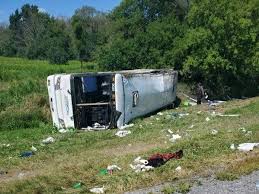Driver pleads guilty to impaired driving in relation to crash that killed spouse
The fatal crash occurred July 9, 2022, on York Road in Niagara-on-the-Lake.A Niagara man has pleaded guilty to impaired driving in connection with a 2022 crash in Niagara-on-the-Lake that claimed the life of his spouse.
Brandon Rioux, 39, appeared in Ontario Court of Justice in St. Catharines Monday and pleaded guilty to several charges, including impaired operation of a conveyance causing death.Driver Pleads Guilty to Impaired Driving in Fatal Crash Involving Spouse
A driver involved in a tragic crash that claimed the life of his spouse has pleaded guilty to charges of impaired driving causing death. The case, which unfolded over the course of several months, has captivated the local community, raising important questions about the dangers of impaired driving and the impact such incidents have on the families and individuals involved.
The Incident: A Tragic Night That Changed Lives Forever
The fatal crash occurred late one evening in mid-November, when the driver, identified as 36-year-old Jonathan Harris, lost control of his vehicle while driving along a rural highway in a suburban area. Harris and his wife, Anna, were traveling home after attending a family gathering when the vehicle veered off the road and struck a tree. The impact was devastating, and emergency responders were called to the scene almost immediately.
When paramedics arrived, they found Anna Harris, 34, unresponsive in the passenger seat. Despite efforts to resuscitate her, she was pronounced dead at the scene. Jonathan Harris, though seriously injured, was conscious and taken to a nearby hospital for treatment.
Investigators later determined that Harris had been under the influence of alcohol at the time of the crash. Blood alcohol concentration (BAC) tests revealed that his BAC was more than double the legal limit, sparking further questions about the decisions made that fateful evening.
The Aftermath: A Heartbreaking Loss
The loss of Anna Harris sent shockwaves through the local community. Friends, family, and colleagues were left grappling with the sudden and tragic death of a beloved individual. Anna, who had worked as a nurse at the local hospital, was known for her compassion and dedication to her patients. She had been married to Jonathan for nearly seven years, and their relationship was described as a loving and supportive partnership.
For Jonathan Harris, the consequences of that night would be far-reaching, both legally and personally. He had not only lost his wife but would also have to confront the guilt of knowing that his impaired driving had been the cause of her death. Overwhelmed by the tragedy, Harris struggled with his emotions and the immense burden of his actions.
In the aftermath of the crash, Harris was arrested and charged with multiple offenses, including impaired driving causing death, impaired driving causing bodily harm, and failure to remain at the scene of the accident. The case was taken to court, and Harris faced the prospect of a lengthy trial.
A Plea of Guilt: Accountability and Consequences
After months of legal proceedings and deliberations, Jonathan Harris decided to plead guilty to the charge of impaired driving causing death. The decision came after a thorough review of the evidence and discussions with his legal team. Harris’s guilty plea, while sparing him from a lengthy trial, also served as a formal admission of his responsibility for the death of his wife.
During the court hearing, Harris appeared visibly remorseful as he addressed the judge. In a brief statement, he expressed his deep regret for the actions that had led to the crash. “There is no way to undo the harm I have caused. I never intended for anything like this to happen, but I take full responsibility for my actions,” Harris said through tears.
His lawyer, in turn, emphasized that Harris had shown sincere remorse for his actions and had cooperated fully with law enforcement throughout the investigation. The defense team argued that Harris had been struggling with personal and emotional issues at the time of the crash, including the loss of a close family member just weeks prior to the incident, which had affected his judgment.
Nevertheless, the prosecution emphasized that impaired driving, regardless of the circumstances, could not be excused. “Alcohol was a contributing factor in this tragic event, and no amount of remorse can bring back the life that was lost,” the prosecutor stated. “The victim’s family has been irreparably damaged, and we cannot ignore the consequences of a choice that was made that night.”
The judge ultimately accepted the guilty plea, and Jonathan Harris was sentenced to 12 years in prison for impaired driving causing death. In addition to the prison sentence, he was also ordered to pay restitution to the victim’s family and undergo counseling for alcohol addiction. The decision brought some closure to the victim’s family, though the pain of their loss would never fully heal.
The Impact on Family and Friends
The consequences of impaired driving extend far beyond the legal system. For Anna’s family, the loss of their daughter, sister, and friend has been devastating. In an emotional statement delivered outside the courthouse, Anna’s parents spoke about the void left in their lives by their daughter’s untimely death.
“Anna was a bright light in all of our lives. She had so much to give to the world, and it is hard to imagine a future without her in it,” her mother, Margaret, said through tears. “We will never understand why this happened, but we hope that something good can come from it. We want to make sure that people understand the dangers of impaired driving.”
Anna’s friends and colleagues also mourned her loss deeply. “She was the kind of person who would go above and beyond for anyone,” said Jennifer Lawson, a colleague of Anna’s at the hospital. “Her loss has left a hole in our hearts, and I don’t think we’ll ever fully recover from it.”
For Jonathan Harris, the emotional toll of the crash was also immense. In addition to the guilt he would carry for the rest of his life, Harris faced the reality that his actions had taken the life of the person he loved most. “I can’t imagine the pain they are feeling,” Harris said in a statement to the media after the plea. “I have to live with what I’ve done for the rest of my life.”
The Broader Conversation: The Dangers of Impaired Driving
This tragedy has prompted renewed calls for action on impaired driving prevention. Advocates for safer roads have pointed to the incident as a stark reminder of the dangers posed by driving under the influence of alcohol or drugs. While the statistics on impaired driving deaths are well-known, incidents like this remind us of the real human toll behind the numbers.
In many regions, impaired driving is a leading cause of death on the roads, with thousands of lives lost each year due to alcohol-related accidents. Despite the well-publicized risks and the availability of alternatives like ridesharing services, impaired driving continues to be a significant problem.
Efforts to combat impaired driving have included public awareness campaigns, stricter penalties for offenders, and increased law enforcement efforts to catch impaired drivers before they cause harm. However, advocates stress that more work needs to be done to change societal attitudes about alcohol consumption and driving.
“We need to change the mindset that it’s okay to drive after drinking,” said Sarah Turner, a spokeswoman for a national road safety organization. “People often think they’re ‘fine’ or ‘just a little buzzed,’ but even small amounts of alcohol can impair reaction times and decision-making. Every single one of these incidents is preventable.”
A Call for Compassion and Change
The tragic death of Anna Harris has underscored the profound emotional and physical toll that impaired driving can have on individuals and families. It has prompted a wider conversation about personal responsibility, the importance of making safe choices, and the need for a culture change when it comes to alcohol consumption and driving.
As Jonathan Harris serves his prison sentence, the legacy of this tragedy will continue to reverberate in the lives of all those affected. For the family of Anna Harris, their pain will never fade, but they hope that sharing their story will serve as a reminder to others to make better decisions behind the wheel. And for Jonathan Harris, the road to redemption will be a long and difficult one, but it will be one that he must take if he is to ever truly find peace.
In the end, the plea of guilty, the prison sentence, and the ongoing mourning reflect the stark reality that impaired driving has consequences far beyond the momentary decision to get behind the wheel after drinking. It can destroy lives, families, and communities in an instant, and the price paid can never be undone.






